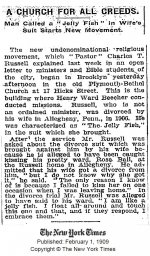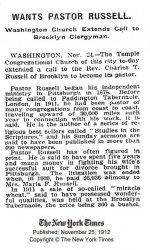A CHURCH FOR ALL CREEDS
Man Called a "Jelly Fish" in Wife's Suit Starts New Movement.
(The New York Times, Feb. 1, 1909.)
The new undenominational religious movement, which " Pastor" Charles T. Russell explained last week in an open letter to ministers and Bible students of the city, began in Brooklyn yesterday afternoon in the old Plymouth-Bethel Church at 17 Hicks Street. This is the building where Henry Ward Beecher conducted missions. Russell, who is not an ordained minister, was divorced by his wife in Allegheny, Penn., in 1906. He was characterized as “The Jelly Fish," in the suit which she brought.
After the service Mr. Russell was asked about the divorce suit which was brought against him by his wife because he is alleged to have been caught kissing his pretty Ward, Rosa Ball, at the Russell home in Allegheny. He admitted that his wife got a divorce from him, “but I do not know why she got it," he said. "The only reason I know of is because I failed to kiss her on one occasion when I was leaving home.” In the divorce trial Mr. Russell was alleged to have said to his ward, “I am like a jelly fish. I float all around and touch this one and that, and if they respond, I embrace them."


